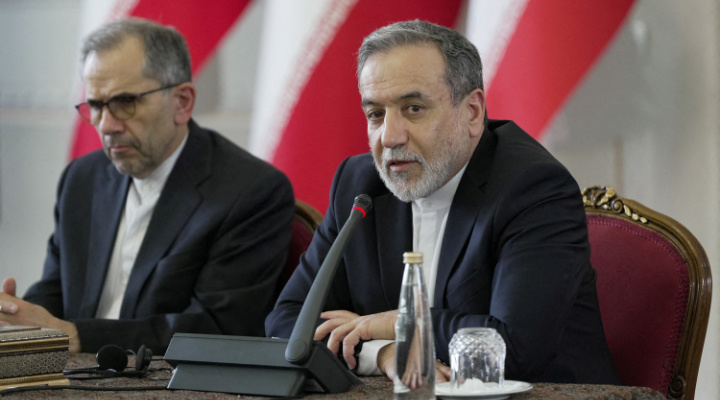Iranian Foreign Minister Abbas Araqchi speaks during a meeting with foreign ambassadors in Tehran, Iran, July 12, 2025. Photo: Hamid Forootan/Iranian Foreign Ministry/WANA (West Asia News Agency)/Handout via REUTERS
In a world grappling with persistent threats of terrorism and financial crimes, the international community must not be swayed by superficial gestures.
While Tehran’s recent ratification of the Palermo Convention against transnational organized crime may seem like a step in the right direction on the surface, it is likely a calculated move designed to distract from the regime’s continued and unwavering support for global terrorism.
The Financial Action Task Force (FATF) reportedly plans to meet with Tehran’s bureaucrats to review whether the Islamic Republic of Iran has complied with its action plan to be removed from its blacklist.
However, the global financial watchdog must resist the temptation to remove Tehran from the list, because the Islamic Republic fundamentally remains committed to funding terrorism and engaging in illicit financing. To remove Tehran would be to ignore a mountain of evidence that supports this unequivocal fact.
In fact, removing Iran would endanger the integrity of the international financial system.
For years, the Islamic Republic has been a leading state sponsor of terrorism. No single treaty that Iran may ratify can disguise this fact.
The regime’s Islamic Revolutionary Guard Corps (IRGC) has a long and bloody history of plotting assassinations on American soil and overseas, targeting high-profile figures like President Donald Trump, journalists, dissidents, and ordinary citizens. This is not the conduct of a state genuinely committed to combating organized crime. It is the action of a rogue regime that uses terror as a primary tool of its foreign policy.
The recent move by Iran’s Expediency Discernment Council to ratify the United Nations’ Palermo Convention — after years of refusing to do so — is a classic example of Tehran’s diplomatic gamesmanship.
Tehran understands its presence on the FATF blacklist has crippled its economy, It is desperate for a reprieve. However, the regime has refused to ratify the most crucial of the FATF-required treaties: the International Convention for the Suppression of the Financing of Terrorism (CFT).
By refusing to do so, Tehran is signaling its intention to continue funding terrorist proxies including Hamas, Hezbollah, and the Houthis. Nor has Iran abandoned the facilitation network it has provided to Al-Qaeda. While Tehran may one day feel compelled to ratify the CFT for economic reasons, removing it from the blacklist should take place only if commensurate conduct changes on the terrorism front — and that change is sustained.
The international community has already witnessed the devastating consequences of Iran’s terror financing. The Hamas attack on Israel on October 7, 2023, was inspired, funded, and enabled by Tehran. The regime’s support for the Houthis in Yemen has destabilized the region and disrupted global trade, costing the United States and its allies billions of dollars. Tehran’s backing of Hezbollah in Lebanon threatens the security of Israel and the stability of the entire Middle East. Iran should not be welcomed back into the global financial fold until it changes its conduct, not merely purports to agree to an item on a technical checklist.
The FATF has a clear mandate: to protect the global financial system from money laundering and terrorist financing. To fulfill this mandate, it must hold Iran to the same standard as every other nation. This means insisting on full and unconditional compliance with all FATF requirements, including the ratification of the CFT and demonstrable adherence to its principles. There can be no exceptions, carve-outs, or special treatment for a regime that has blatantly and repeatedly violated international law and circumvented sanctions.
Tehran’s diplomatic overtures are nothing but a smokescreen. As long as the regime continues to fund terrorism, plot assassinations, and destabilize the Middle East, it must remain on the FATF blacklist. The security of the United States and its allies, and the integrity of the global financial system, depend on it. The message to Tehran must be clear: words are not enough. Its actions and malign conduct must change.
Saeed Ghasseminejad is a senior advisor at the Foundation for Defense of Democracies (FDD). Toby Dershowitz is managing director at FDD Action, FDD is a Washington, DC-based, nonpartisan research institute focused on national security and foreign policy. FDD Action is a non-partisan 501(c)(4) organization established to advocate for effective policies to promote US national security and defend free nations. Follow the authors on X @SGhasseminejad and @tobydersh.
Click this link for the original source of this article.
Author: Saeed Ghasseminejad and Toby Dershowitz
This content is courtesy of, and owned and copyrighted by, https://www.algemeiner.com and its author. This content is made available by use of the public RSS feed offered by the host site and is used for educational purposes only. If you are the author or represent the host site and would like this content removed now and in the future, please contact USSANews.com using the email address in the Contact page found in the website menu.





